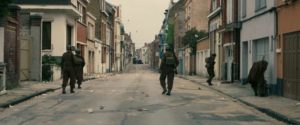Ok, before you go on with the rest of this article I need you to stop what you’re doing for a few seconds and just listen to whats going on around you. Don’t think. Just listen. I’ll wait.
Alright cool now that those of you who actually cared enough to stop reading are back, let’s get to it. No matter where you are right now, the sound is one of the main things that sets the mood and feeling. Whether that be the low murmur of the COM Lounge or the loud thinking of angry Boston drivers as you read this on your phone walking down Comm Ave. Sound creates the world around you more than you notice day-to-day. And that’s why I think it is the most underrated tool when it comes to storytelling- in particular in filmmaking.
At this year’s Oscars, Dunkirk took home both the Sound Design and Sound Editing awards (yes, I was the only person I know who cared about those two awards) and is a perfect example to drive home my point. The movie begins with a small group of soldiers moves along a street. Throughout the beginning of this scene, there is an eerie silence. So much that you can hear the sound of the soldiers’ equipment ruffling and footsteps on the cobblestone paths, in addition to the fluttering of German leaflets, demanding surrender, to the ground. It creates a sense of calm and peace for the viewer, making them believe that the town the soldiers are in is abandoned, but that is shattered in a heartbeat with the quick but deafening sound of gunshots. Suddenly the previously steady music I noted scene has become louder and quicker, and the soldiers are running.
Although there is a multitude of gunshots heard, very few bullets are seen. But they don’t need to be. The audience knows what that deafening sound is, and more importantly, what it means.
 Now you may think I’m thinking way too into this, but think about if Christopher Nolan had decided to do something different. What if the music had been ramped up from the beginning, creating tension from the very start. Then, change the gunshots a bit so that they are a little softer, and a little more spread out. Suddenly, they sound farther away, almost like warning shots, as opposed to an attempt on the soldiers’ lives. This gives a slightly different motivation as to why the soldiers are running, as now instead of the thought that they could die any second running through their head, they now simply believe that they should get out of the town as quickly as possible before they’re found. In addition, now the audience has less of a sense of tension and dread, and more one of thrill, feeling almost anxious about whether the soldiers will make it out of the town, on the edge of their seats.
Now you may think I’m thinking way too into this, but think about if Christopher Nolan had decided to do something different. What if the music had been ramped up from the beginning, creating tension from the very start. Then, change the gunshots a bit so that they are a little softer, and a little more spread out. Suddenly, they sound farther away, almost like warning shots, as opposed to an attempt on the soldiers’ lives. This gives a slightly different motivation as to why the soldiers are running, as now instead of the thought that they could die any second running through their head, they now simply believe that they should get out of the town as quickly as possible before they’re found. In addition, now the audience has less of a sense of tension and dread, and more one of thrill, feeling almost anxious about whether the soldiers will make it out of the town, on the edge of their seats.
That is the power of sound. It gives life to the things you see and creates the world around them. It changes the way you feel and experience a moment, whether you know it or not. So don’t just watch movies. Listen to them, too.